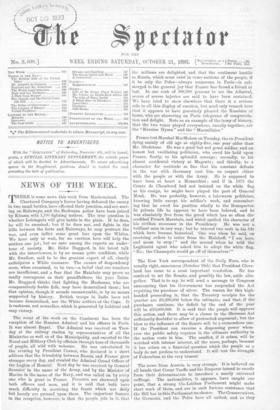The event of the week on the Continent has been
the reception of. the Russian Admiral and his officers in Paris. It was almost Royal. The Admiral was received on Tues- day at the railway station by representatives of all the Ministries as well as of the Municipality, and escorted to the Naval and Military Club by officials through tens of thousands of people, all wild with welcome. He was entertained in the evening by President Carnet, who declared in a short address that the friendship between Russia and France grew stronger every day, and created the Admiral Grand Officer of the Legion of Honour. Next day he was received by General Saussier in the name of the Army, and by the Minister of Marine in the name of the Navy, and was called on by every one who is great in France. Presents are showered upon both officers and men, and it is said that both have much difficulty in surviving the feasts which not daily but hourly are pressed upon them. The important feature in the reception, however, is that the people join in it. that the millions are delighted, and that the sentiment hostile to Russia, which must exist in some sections of the people, if it be only the Poles—always numerous in Paris—is sub- merged in the general joy that France has found a friend at last. In one rush of 300,000 persons to see the Admiral, scores of severe injuries are said to have been sustained. We have tried to show elsewhere that there is a serious side to all this display of emotion, but need only remark here that it appears to have genuinely pleased the Russians at home, who are showering on Paris telegrams of congratula- tion and delight. Note as an example of the irony of history, that the two tunes played everywhere, usually together, are the "Russian Hymn" and the " Marseillaise."


































